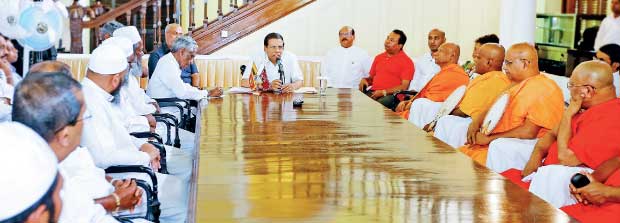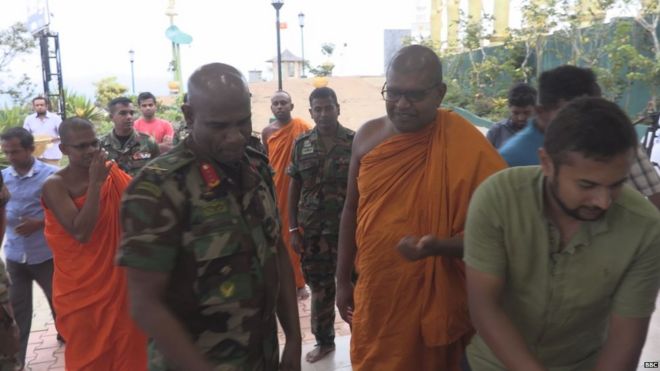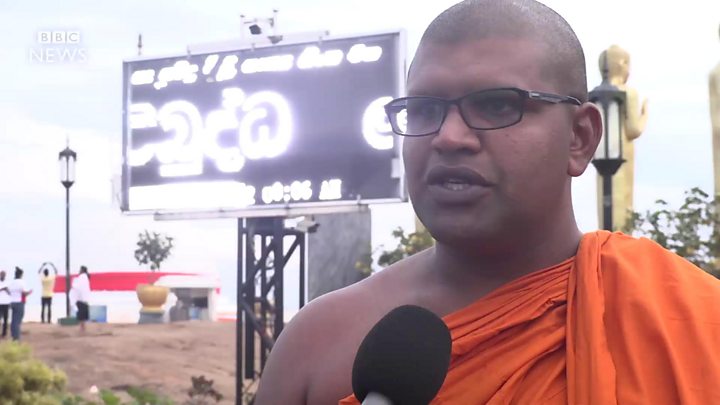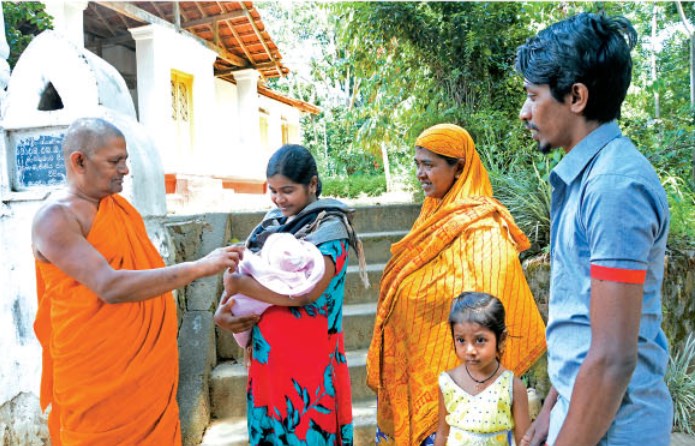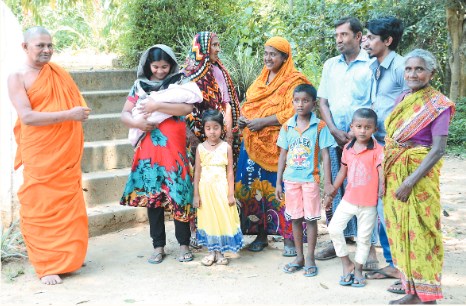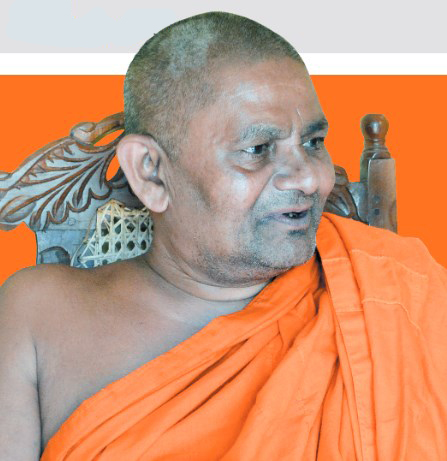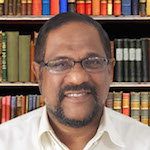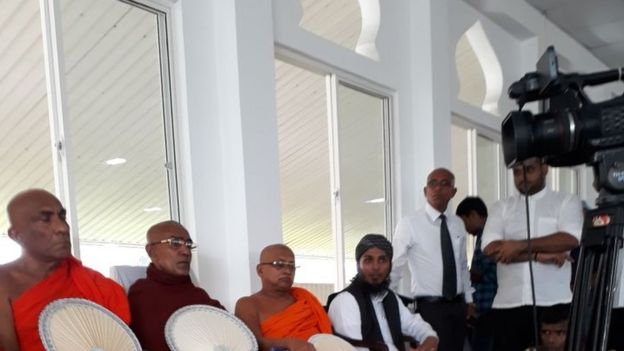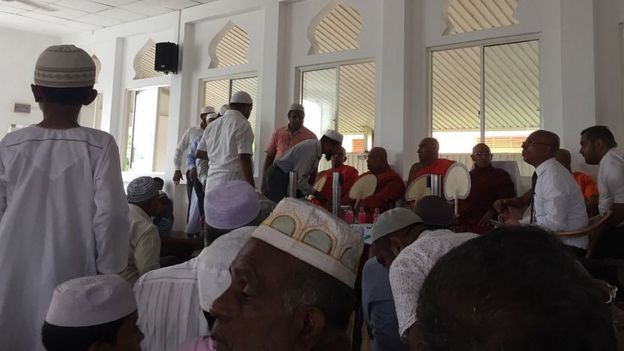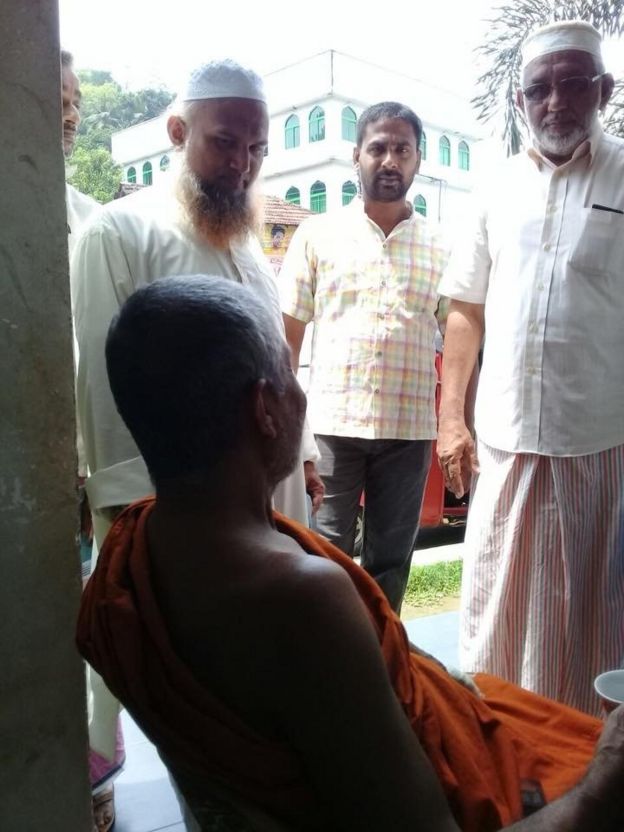Monday, 12 March 2018 17:19
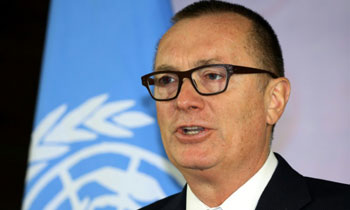 The UN's political chief on Sunday condemned anti-Muslim violence that has targeted mosques and businesses in Sri Lanka as he wrapped up a three-day visit to Sri Lanka.
The UN's political chief on Sunday condemned anti-Muslim violence that has targeted mosques and businesses in Sri Lanka as he wrapped up a three-day visit to Sri Lanka.
Under-Secretary-General for Political Affairs Jeffrey Feltman urged the government to bring the perpetrators of the violence and hate speech to justice.
Feltman, who met with Muslim leaders to show solidarity during his visit, "condemned the breakdown in law and order and the attacks against Muslims and their property," a UN statement said.
Sri Lanka has been rocked by a week of violent riots by Sinhalese mobs who have attacked 11 mosques and at least 200 Muslim-owned businesses, prompting the government to declare a state of emergency.
Three people have been killed and 20 wounded in the anti-Muslim attacks. On Sunday a Muslim-owned restaurant was targeted in the town of Anamaduwa, north of the capital Colombo.
Feltman "urged swift and full implementation of the government's commitment to bring the perpetrators of the violence and hate speech to justice, to take measures to prevent recurrence, and to enforce non-discriminatory rule of law."
Sri Lankan police have been accused of failing to protect the island's minority.
Muslims make up 10 percent of Sri Lanka's 21 million people. The majority are Sinhalese, a largely Buddhist ethnic group.
President Maithripala Sirisena announced Saturday that he will appoint a three-member panel of retired judges to investigate the unrest.
A curfew was lifted in the central district of Kandy, the epicentre of the violence, but soldiers remained on the streets.
Feltman met with Sirisena, the prime minister, civil society and human rights representatives during the three-day visit that was scheduled before the outbreak of violence.
The envoy expressed hope that an office of missing persons will be set up soon to determine the fate of those unaccounted for from the brutal 25-year war against Tamil Tiger rebels.
"He expressed concern that many elements of the government's visionary 2015 program seem stalled, despite their importance to sustainable peace, security and prosperity in Sri Lanka," said the statement.
Feltman said he received assurances from government leaders that they are moving forward with democratic reforms. (AFP)
http://www.dailymirror.lk/article/-UN-condemns-anti-Muslim-attacks-in-Sri-Lanka-147138.html
Monday, 12 March 2018 17:15
By Mass L. Usuf –
Very unexpectedly a close Sinhalese friend of mine asked me why did not the Muslims retaliate when they were attacked? I was perplexed. Firstly, because he is a Sinhalese and, secondly, the thought of attacking people never occurs in the mind of a practising Muslim. Out of curiosity, I asked him “What do you mean by retaliate?” He said, “You all should have attacked business premises of the Sinhalese people in areas where you all are in majority.” Now, I became curious, since this is a Sinhalese speaking about attacking the Sinhalese. I asked him “What the hell is wrong with you and why are you talking like this?” He replied, “I am disgusted with these fellows. Believe me, after university I have never stepped into a temple.” Him mentioning ‘temple’ reminded me of our youthhood. I humorously reminded him how both of us used to hang around in the temple compound to catch a glimpse of his girlfriend. I said “Machan api bodhi pooja atha gaanawa mathakada, hebai esdeka wena kohedo neda.” He replied, “Those days are now gone. I really feel sorry for our growing up kids”
The question as to why the Muslims did not retaliate by attacking Sinhala houses or business premises requires an explanation. I have to distinguish here between a practising Muslim and a non-practising Muslim. The majority are generally, practising Muslims. In fact, the only religion in the world which has the largest number of practising followers is Islam. Anyway, we have our quota of black sheep like in any other community. A realistic comparison would be the Sinhalese racists who perpetrated the recent violence. They do not represent the majority of the respectable Sinhalese people. In fact, their criminal behaviour has embarrassed many Sinhalese people who feel ashamed.
Be Just Even To The Enemy
Self-defence is a religious obligation in Islam. Also, retaliating when attacked or repulsing an attack form part of this obligation. However, this obligation is restricted by several conditions. According to Islamic teachings, it is strictly prohibited for a Muslim to harm another innocent person for no reason. It is, also, strictly prohibited for a Muslim to wantonly take the life of another human being, whether Muslim or non-Muslim. Therefore, in response to the attack on Muslims in Digana, one cannot attack an innocent Sinhalese person in the streets of another part of Sri Lanka. Just because that person happens to be a Sinhalese. In the same manner, a Muslim cannot burn a house or a shop of an innocent Sinhalese person elsewhere. He would be committing a grave sin according to the teachings of Islam. Even at times like this Islam teaches equity and justice to be applied to all including the enemy. This partly explains why there were no such reprisals. The Quran states:
“O you who believe! Stand out firmly for Allah and be just witnesses and let not the enmity and hatred of others make you avoid justice. Be just: that is nearer to piety, and fear Allah. Verily, Allah is Well Acquainted with what you do.” (Chapter 5 Verse 8).
“O you who believe! Stand out firmly for justice, as witnesses to Allah, even though it be against yourselves, or your parents, or your kin, be he rich or poor,…” (Chapter 4 Verse 135).
‘Islam’ Means ‘Peace’
Islam also enjoins the Muslims to respect the law of the country in which they live so long as it does not violate the teachings of Islam. On that basis, Muslims as citizens of this country would expect the law enforcement authorities to establish law and order, prevent violence against persons and property and provide protection to the public. The requirement of taking the law into one’s hand does not arise under these circumstances.
The meaning of the word ‘Islam’ is ‘Peace’. Islam teaches several moral and ethical values which guides human beings towards living in society with peace and tolerance. Muslims believe that Allah is the Most Merciful; that Allah is the Most Forgiving; That Allah is the Pardoner of sins. Therefore, a good Muslim is never revengeful, is never unforgiving or is never unpardoning. On the contrary, a Muslim goes on the premise that when Allah, the Almighty is the Most Forgiving and the Most Merciful why should not I be merciful and forgiving towards another human being. After all, according to Islam it is our belief that Allah is the Creator of all mankind which obviously includes the Sinhalese people too.
“O mankind, worship your Lord who created you and those who lived before you, so that you may become righteous.” (Chapter 2 Verse 21)
Patience An Exalted Quality
A practising Muslim always strives to be patient to the best possible extent in any given situation. This also constitutes the part of the Islamic ethics which exalts the conduct of patience in a Muslim. The behaviour of the Muslim is what it is because of the act of forgiveness, mercy and the practise of patience at times of trials and tribulations. The Quran states:
“We shall test you through fear, hunger, loss of life, property, and crops. Give glad news to the people who have patience.” (Chapter 2 Verse 155)
There is a misconception amongst the Sinhalese racists who always alleges especially, in the social media that the Muslims act innocent and harmless when they are weak but will not hesitate to kill someone if they are in power. Therefore, the Muslims cannot be trusted. This is an utterly false statement and by this these racists are deceiving the Sinhalese people. They want to sow the seed of hatred in the minds of people and to this end would not stop at anything good or bad, right or wrong, moral or immoral. Shameless creatures, aren’t they?
Boastful Cowards
A distinction has to be drawn between being a coward and being an individual who practises patience. It is not an act of bravery but absolute cowardism to come in organised groups, armed with weapons and then attack innocent men, helpless women and traumatised children. Not only that, to solicit the support and complicity of the Police and the Special Task Force, to set alight closed shops, places of religious worship and houses of people who have not done any wrong to anyone. The lack of conscientiousness in these sick people is further amplified by their claim of heroism or boast as seen in Venerable Gnanasara Thero recent statement for example.
On the other hand, a person practising patience should not be misunderstood as being cunning or pretentious or as being a coward. The Muslims have shown great maturity on the face of the puerile behaviour of the ‘grown up’ racists and some self-deluded racist politicians, who think that they are smarter. The Muslims would not want to exacerbate a given situation by acting on their own. These are some of the virtues and values that restrains the practising Muslims from retaliating. As peace loving and law-abiding citizens, I think the Muslims are a great asset to this island, as part of a community showcasing multi-cultural, multi religious and multi ethnic diversity in unity.
“O you who believe! have patience, help each other with patience, establish good relations with one another, and have fear of God so that you may be successful..” (Chapter 3 Verse 200)







